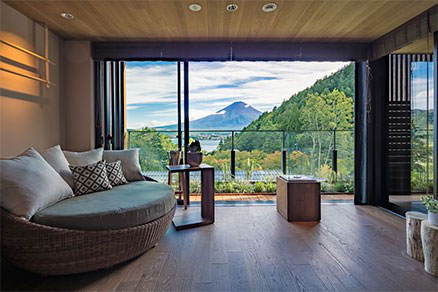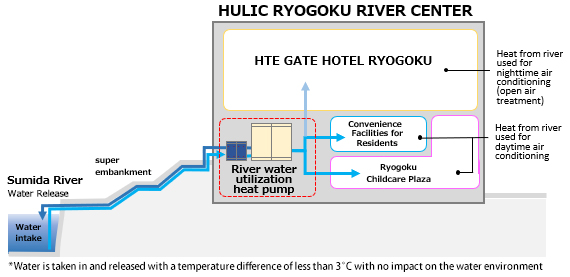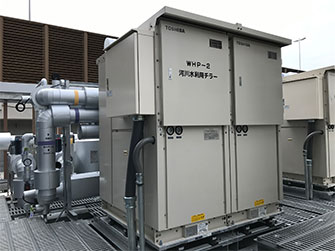Effective Use of Unused Energies
Unused energies are generic term of energies that have not been used in the past despite the fact that they could be used effectively which include heat disposed from buildings and factories, and difference in temperature of river water, ground water, or sewage water. As a way to efficiently utilize energy for the reduction of environmental load, we are working on the advanced utilization of unused energy according to location conditions, asset type, and the characteristics of development projects.
Case Study1: Use of Exhaust Heat of Hot Springs at FUFU Kawaguchiko
At FUFU Kawaguchiko, our ryokan (a Japanese style luxury inn), the exhaust heat of flowing hot spring water which had been disposed in the past is collected by highly efficient heat pump and introduced as a hot spring exhaust heat utilization system which is used as a supplemental heating source for the water heater of ryokan. The effect of introducing this system resulted in an approximately 30% decline in water heating energy consumption. The system received subsidy from the Ministry of Economy, Trade and Industry as the FY2017 and FY2018 subsidy on business that promote local production for local consumption by making use of local features.

Case Study 2: An Air-conditioning System that Utilizes Energy from the Difference in Temperature with the River Water in the HULIC RYOGOKU RIVER CENTER
In the HULIC RYOGOKU RIVER CENTER (a PPP project), which was completed in 2020, we focused on the Sumida River adjacent to the site of the property and installed an air-conditioning system that utilizes energy from the difference in temperature with the river water. Praised for its advanced nature, the project was selected by Cool Net Tokyo (Tokyo Metropolitan Center for Climate Change Actions) as a “project to expand the introduction of renewable energy on a local production for local consumption basis.” The River Water Temperature Difference Energy Utilization Equipment uses a purpose-built heat pump to provide air conditioning in the facility by extracting heat from or releasing heat to the river water, within a range that does not affect the environment, as the temperature of the river water is cooler than the outside air in summer and warmer in winter. Compared with air-source heat pumps that transfer heat absorbed from the outside air to an indoor space, such as household air conditioners, this enables facilities to be air conditioned with less energy consumption. It is estimated that this project will reduce the annual energy consumption for air conditioning in the target area by approximately 12%.
Air conditioning system making use of river water (image)


